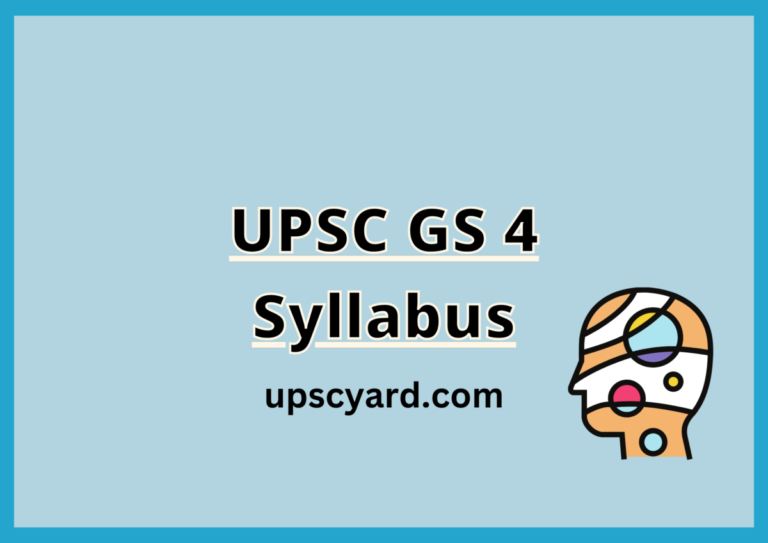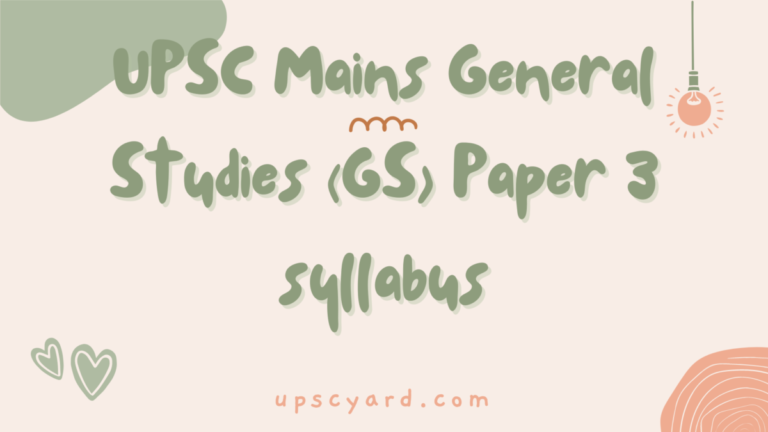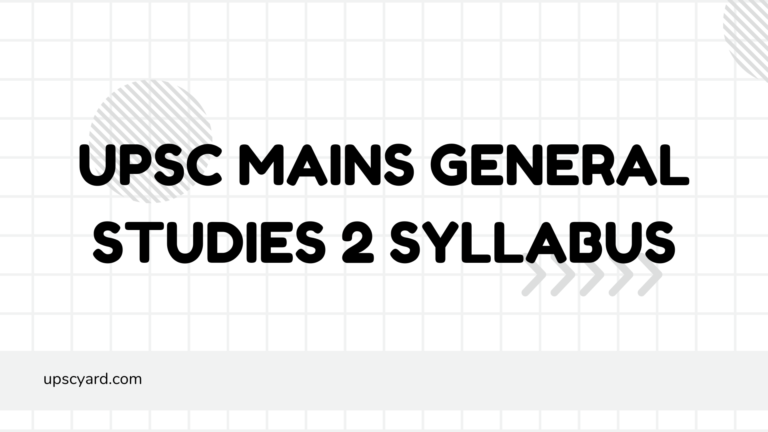click here for UPSC prelims booklist.
UPSC PRELIMS SYLLABUS
The UPSC Prelims Syllabus outlines the annual Civil Service Exam conducted by the Union Public Service Commission (UPSC), aiming at prestigious positions within the Government of India, such as IAS, IPS, IFS, and IRS, among others. Aspirants need to successfully navigate three stages of the exam: Prelims, Mains, and Interview Round, to be considered for these esteemed roles.
The UPSC Prelims Exam comprises two papers: General Studies Paper and CSAT. Qualifying the Prelims Exam is a prerequisite for proceeding to the UPSC Mains Exam. The UPSC Prelims is the initial filtering phase of the Civil Services Exam, organized by the Union Public Service Commission annually. While officially referred to as the Civil Services (Preliminary) exam, it is commonly known as UPSC Prelims or IAS Prelims among aspirants.
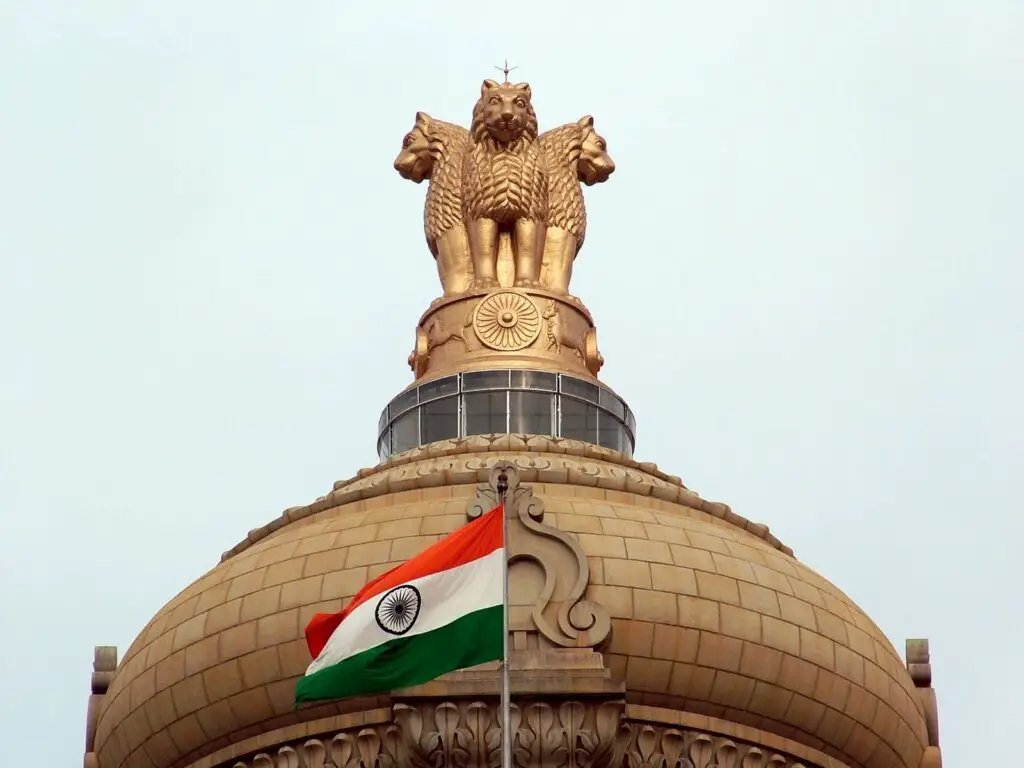
PRELIMINARY EXAMINATION:
The Examination shall comprise of two compulsory Papers of 200 marks each.
Note:
(i) Both the question papers will be of the objective type (multiple choice questions) and
each will be of two hours duration.
(ii) The General Studies Paper-II of the Civil Services (Preliminary) Examination will be a
qualifying paper with minimum qualifying marks fixed at 33%.
(iii) The question papers will be set both in Hindi and English.
UPSC prelims syllabus
Exam pattern for UPSC CSE PRELIMS
| Name of papers | General Studies Paper-I General Studies Paper-II (CSAT) |
| Total Number of Marks | * GS Paper-I – 200 Marks * CSAT – 200 Marks |
| Number of Questions asked in GS Paper- 1 | 100 |
| Number of Questions asked in CSAT | 80 |
| Time Allotted | Two hours each; * GS Paper-I – 2 Hours (9:30 AM -11:30 AM) * CSAT – 2 Hours (2:30 PM – 4:30 PM) |
| Negative Marking | ⅓ of the total marks allotted to the question will be deducted for every wrong answer or Multiply 0.67 to wrong answers |
UPSC PRELIMS SYLLABUS for GS Paper (Prelims Paper I)
- Current events of national and international importance.
- History of India and Indian National Movement.
- Indian and World Geography-Physical, Social, Economic Geography of India and the World.
- Indian Polity and Governance – Constitution, Political System, Panchayati Raj, Public Policy, Rights Issues, etc.
- Economic and Social Development – Sustainable Development, Poverty, Inclusion, Demographics, Social Sector initiatives, etc.
- General issues on Environmental Ecology, Biodiversity, and Climate Change – that do not require subject specialisation.
- General Science
UPSC PRELIMS SYLLABUS for CSAT Paper (Prelims Paper-II)
- Comprehension
- Interpersonal skills including communication skills
- Logical reasoning and analytical ability
- Decision-making and problem solving
- General mental ability
- Basic numeracy (numbers and their relations, orders of magnitude, etc.) (Class X level), Data interpretation (charts, graphs, tables, data sufficiency, etc. – Class X level)
A handful of important sources for current events prep work for UPSC PRELIMS SYLLABUS
- Yojana Magazine and Kurukshetra Magazine
- Economic and Political Weekly
- Press Information Bureau Releases (PIB)
- The Hindu and The Indian Express
UPSC Prelims syllabus subject-wise
UPSC Prelims syllabus mind map
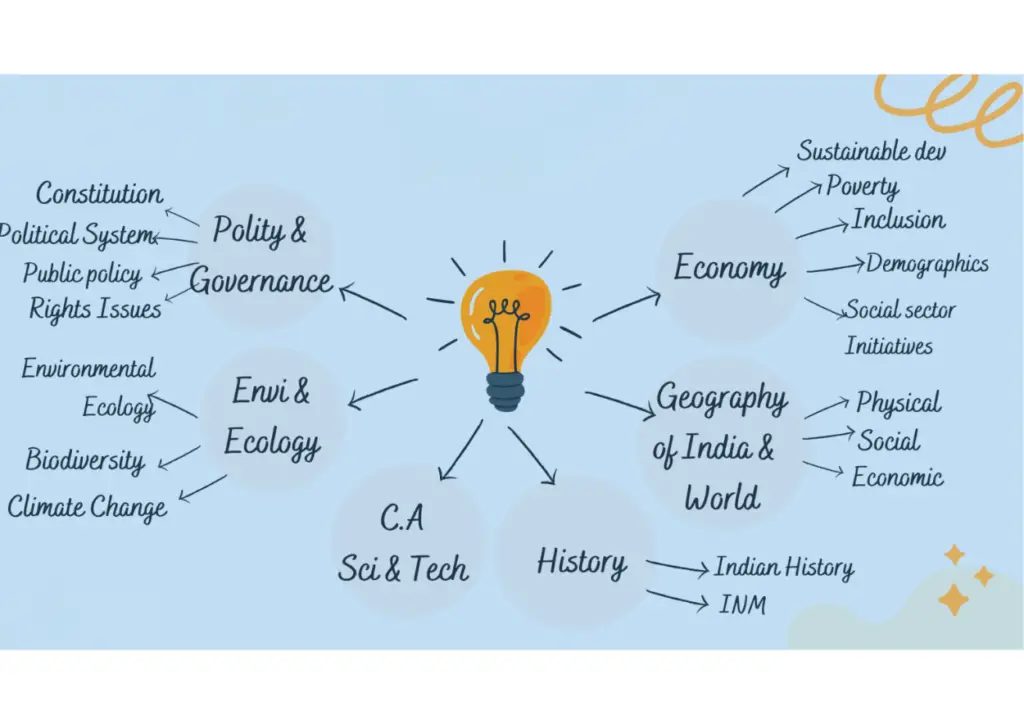
Geography
The geography segment encompasses a comprehensive exploration of the Physical, Social, and Economic aspects of both India and the global landscape in the UPSC prelims syllabus
| Physical Geography | Principles of Indian Geography |
|---|---|
| General Geography | Physiography of India |
| Universe | Drainage System |
| Earth Evolution | Climate |
| Geomorphology | Soils in India |
| Earth’s Interior | Natural Vegetation |
| Geology and Rock System | Population |
| Geomorphic Process | Settlements and Urbanization |
| Earthquakes and Volcanism | Land Resource |
| Distribution of Continents and Oceans | Mineral Resource |
| Landforms and their evolution | Energy Resource |
| Landforms across the world | Agriculture and Basic Terminology |
| Recent development in agriculture | |
| Oceanography | Productivity of Crops |
| Hydrosphere | Industry |
| Submarine Relief Features | Transport |
| Temperature and Salinity | Recent developments in Industry and Transport |
| Waves, Oceans, Currents, Tides | World Regional Geography |
| Marine Resources | Continents, Countries, and Cities |
| Ocean, Deposits and Corals | Location in News |
| Climatology | |
| Atmosphere | Human and Economic Geography |
| Inversion of Temperature | Demography and Census |
| Insolation and Heat Budget | Human Development |
| Air Mass, Fronts, Cyclones and Jet Streams | Economic Activities |
| Wind and Pressure Belts | Transport and Communication |
| Precipitation | International Trade |
| Climate Zones of the World | Settlement |
History
Indian History is broadly classified into three significant eras: Ancient History, Medieval History, and Modern History. The examination paper will include inquiries regarding the “History of India and Indian National Movement.” This extensive categorization demands a strategic and systematic approach to prepare for History in accordance with the UPSC Prelims syllabus.
| Ancient History of India | Medieval Indian History | Modern India – Indian National Movement |
|---|---|---|
| Prehistoric cultures in India | Early Medieval India | British extension |
| Indus Valley Civilization | Major dynasties | Economic Impact of the British Raj |
| Vedic society | Cultural trends (750-1200) | Cultural encounter and social changes |
| Formation of the State and urbanisation | 13th and 14th Centuries | Confrontation to British rule |
| Buddhism and Jainism | The 15th and early 16th Century | Indian Freedom struggle – first stage |
| The Mauryan Empire | The Mughal Empire | Gandhian thoughts and techniques |
| Post-Mauryan India | The decline of the Mughal Empire | Separatist movements in Indian politics |
| Satavahanas and Sangam texts | Most important components of composite culture | India independent to 1964 |
| Indo-Greeks, Kushans, etc. | Rise of the Urdu language | Parliamentary, democratic India |
Indian Polity and Governance
The segment on polity encompasses a thorough study of the Constitution, the political system, Panchayati Raj (local governance), public policy, and issues related to rights, among other areas in UPSC prelims syllabus. Polity, as a subject, involves a combination of unchanging foundational principles and dynamic components that evolve over time.
| Preamble | Constitution of India | Union and its Territory |
| Features of preamble | Historical Background | Basic idea about Article 1-4 |
| 42nd Amendment | Drafting committee | State reorganisation and Commissions |
| Swaran Singh committee | Influence of other constitutions | Federal nature |
| Schedules | Salient features | Recent issues |
| Basic idea about 12 schedules | Union | Citizenship |
| Fundamental Rights (FR) | Territory | Basic idea about Article 5-11 |
| Basic idea about Article 12-35 | Directive Principles of State Policy (DPSP) | PIO, NRI, OCI, Pravasi Bharatiya Divas |
| Understanding Articles 14-30 and Art. 32 | Article and Article 36-51 | Privileges for citizens and foreigners |
| FR for citizens and citizens/foreigners | Conflicts between FR and DPSP | Citizenship Amendment Act of 2016 |
| 44th amendment act | Important Amendments | New policies, schemes, changes |
| Fundamental Duties (FD) | Union | |
| Article 51A | Basic idea about Article 52-73 | |
| Difference between FR and FD | Qualification, Election | Prime Minister and Council of Ministers |
| Significance and Criticism | Function and Powers | Basic idea about Article 74-75 |
| Enforcement of FD’s | Resignation, Impeachment | Powers and Functions |
| Judiciary | Role and responsibilities | Council of ministers |
| Basic idea about article related | Parliament | Resignation, Removal |
| Powers of Supreme Court, High Court | Role and functions | Parliament |
| Qualification, appointment | Sessions, Motions | Basic idea about article related |
| Removal procedure | Parliamentary proceedings | Role and functions |
| Recent controversy, verdicts | Lok Sabha, Rajya Sabha | Parliamentary proceedings |
| State Government- State Executive | Special powers of Rajya Sabha | Lok Sabha, Rajya Sabha |
| Governor- appointment, removal | Anti-defection law | Special powers of Rajya Sabha |
| Executive, Legislative, Financial powers | Parliamentary Privileges | Anti-defection law, 10th schedule |
| Discretionary powers of the governor | Bill and lawmaking | Parliamentary Privileges |
| 7th constitutional amendment | Budget, funds summary | Bill and lawmaking procedure |
| Chief Minister and Council of Ministers | Parliamentary Committees | Budget, funds and its summary |
| State Legislature | Parliamentary Committees | |
| Comparison to Parliament | State- center relations | Judiciary |
| Bicameral legislatures | Articles 262, 263 | Basic idea about article related |
| Creation and abolition of Legislative councils | Interstate, Zonal councils | Powers of Supreme Court, High Court |
| Administration of Union Territories (UT) | Inter-State trade | Qualification, appointment |
| Special provision for Delhi | Recent disputes | Removal procedure |
| Administration and jurisdiction in UTs | New policies or schemes | Recent controversy, verdicts |
| Administration of Special Areas | ||
| Special provision for Jammu and Kashmir | Emergency Provisions | State- center and interstate relations |
| Article 370 | National emergency | Articles 262, 263 |
| Differences related to Jammu and Kashmir | State emergency | Interstate, Zonal councils |
| State of FR, Lok Sabha, Rajya Sabha | Financial emergency | Inter-State trade, Recent disputes |
| Revoking emergency | 44th amendment act | New policies or schemes |
| State- center and interstate relations | ||
| Articles 262, 263 | ||
| Composition, functions of Interstate council, Zonal council | ||
| Inter-State trade and Commerce | ||
| Recent disputes between states | ||
| New policies or schemes | ||
| Panchayati Raj and municipalities | Constitution Bodies | |
| Elections, auditing, powers of panchayats | Election Commission | Non-Constitutional Bodies |
| 3-tier structure | UPSC | Basic idea about Composition |
| 73rd and 74th Amendment Acts | SPSC | Functions, Working |
| Relation with FR and DPSP | JPSC | Tribunals |
| Schemes introduced | Finance Commission | Article 323A, tribunals under 323B |
| Metropolitan planning, urban development | SCs, STs, Backward Classes | Recent controversial issues |
| Reservation | Privileges and rights | Different tribunals, importance |
| Current Affairs | Issues related to vulnerable sections | |
| Recent issues in above categories | Current affairs | Important schemes, laws, policies |
| Government Bills and Governance | Government Bills |
General Science
Within the UPSC PRELIMS SYLLABUS, candidates are advised against dedicating excessive time to studying General Science from theoretical textbooks, as a majority of questions are often derived from contemporary topics covered in news and current affairs. Pertinent subjects such as Science & Technology, Defence, Space, Biology, Basic Physics concepts, and Biotechnology hold significant importance within the scope of the UPSC examination and UPSC prelims syllabus.
| Universe | Cell Biology | Human Body Systems |
| Big Bang, Redshift, Blueshift | Cell Organelles | Human Digestive System |
| Star Formation | Carbohydrates | Respiratory System |
| Solar System Formation | Proteins | Endocrine Glands and Hormones |
| Solar System | Vitamins and Minerals | Human Neural System |
| Sun – Internal Structure, Atmosphere | Fats | Muscular and Skeletal System |
| Nuclear Science | Animal Tissues | Genetics |
| Nuclear Fission, Reactor Types | Human Physiology | Mitosis, Meiosis, Cell Division |
| India’s Nuclear Power Programme | Blood and Circulatory System | Mendel’s Laws, Chromosomal Theory |
| Biology | Excretory System | Genetic Disorders |
| Origin and Evolution of Life on Earth | Plants | Health and Diseases |
| Biological Classification | Plant Parts and Functions | Acute, Chronic, Communicable Diseases |
| Five Kingdom Classification | Plant Kingdom | Blood Groups, Circulatory System |
| Plant Biology | Plant Tissue | Excretory System |
| Plant Nutrition | Reproduction | Biotechnology |
| Plant Reproduction | Animal Kingdom | Genetic Engineering, Applications |
| Classification | Vertebrates (Chordata) | Atomic Theory |
| Sexual and Asexual Reproduction in Plants | Human Reproductive System | Structure of an Atom |
Economy
Key subjects like Money & Banking, Monetary Policy, Fiscal Policy, Inflation, and Five-year plans hold noteworthy significance within the realm of the UPSC examination . Delving deeper into the Economy UPSC Prelims Syllabus, a comprehensive breakdown covers Economic and Social Development, encompassing aspects such as Sustainable Development, Poverty, Inclusion, Demographics, and Social Sector initiatives. Notably, the Indian Economy section is a shared component of both the UPSC Prelims syllabus and Mains syllabus , while Economics is also an elective subject for the UPSC Mains.
| Basic Concepts | Macroeconomic Concepts | Microeconomic Concepts |
| Economic Measurements | National Income Calculation | Economic Growth and Development |
| Inflation | Money & Banking | Public Finance in India |
| Money Function & Classification | Financial Markets & Instruments | Budgeting |
| Banking Structure in India | Fiscal Policy | Centre-state Distribution |
| Tax Structure in India | Planning | Meaning, Objective & History |
| Planning Institutions | Five-Year Plans | NITI Aayog |
| Open Economy | Foreign Trade Concepts | International Organizations |
| Trade Agreements | Recent Development | Economic Sectors |
| Poverty | Employment and Unemployment | Government Schemes and Programmes |
Art & Culture
Crucial subjects such as Architecture, puppetry, Classical dance forms, Folk dance, Paintings, and Miniature Paintings ,rock cut temples hold significant weight within the context of the UPSC examination. For an in-depth exploration of the Art & Culture UPSC Prelims Syllabus with a breakdown by topic.
| Architecture | Sculpture | Paintings |
| Diverse Architectural Styles | Carved Stone Sculptures | Mural & Miniature Paintings |
| Historical Monuments | Bronze Figurines | Traditional Pottery |
| Numismatics | Performing Arts | Religion and Literature |
| Study of Ancient Coins | Dance Forms and Traditions | Mythology and Epics |
| Coins as Historical Evidence | Music Heritage | Sacred Texts |
| Festivals | Other Cultural Aspects | |
| National Celebrations | Theater and Drama | Cultural Diversity |
| Regional Festive Traditions | Martial Arts | Folk Art Forms |
Environment & Ecology
Topics of significance encompass Ecosystems, Biodiversity, Mangroves, Coral Reefs, and Climate Change, among others in UPSC prelims syllabus. For comprehensive insights into these subjects, explore further details at the provided source down below
| Biodiversity | Ecology Basics | Ecosystems |
| Origin of Life Forms | Basic Concepts of Ecology | Terrestrial Ecosystems |
| Animal and Plant Diversity | Ecosystem Functions | Aquatic Ecosystems |
| Basics of Biodiversity | Population Ecology | Estuaries |
| Threats to Biodiversity | Adaptation of Species | Mangroves |
| Biodiversity Conservation | Species Interactions | Coral Reefs |
| Wetlands | ||
| Resource Management | Environmental Concerns | Governance |
| Resource Degradation | Environmental Pollution | Environmental Governance |
| Management | Climate Change |


